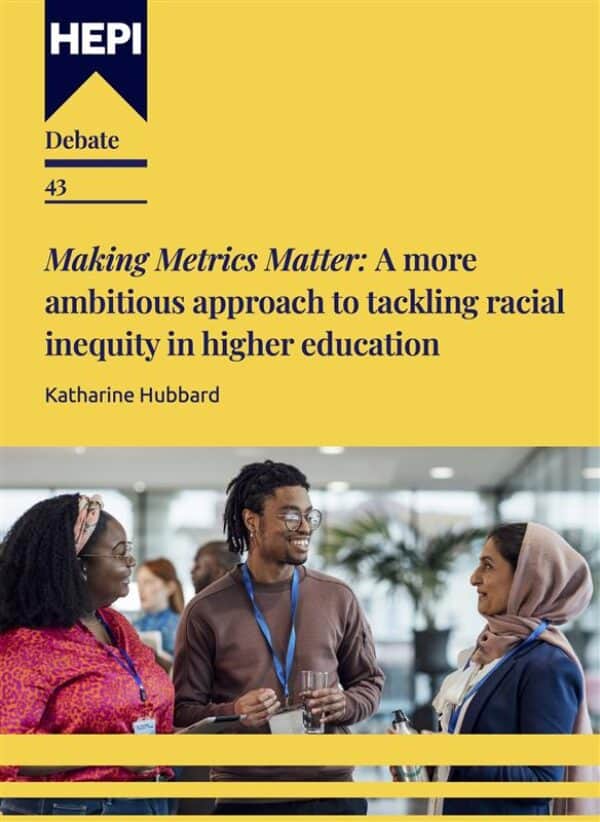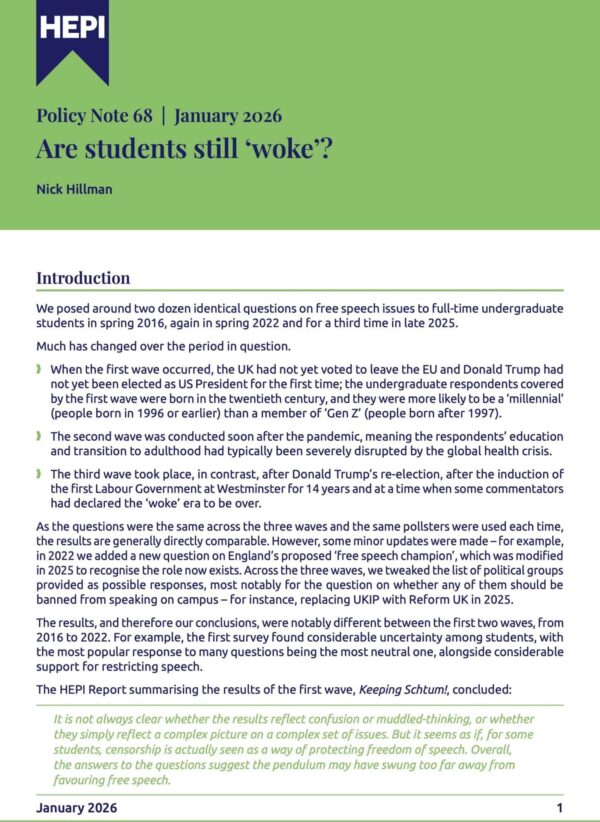How can universities best win back public support?
This blog was kindly authored by Professor Annabel Kiernan, Deputy Vice-Chancellor for Education and Student Experience at Goldsmiths University. It follows her speech at a HEPI event with the same title as this blog, held at the 2025 Conservative Party Conference.
To accept this question at its face and to understand what universities can and should do to build back public support, we need to look at how we got here. In broad terms, universities are not the only institutions whose role, purpose and efficacy are being challenged. There has been a wider breakdown of trust between the public and a wide range of local and national infrastructure, both public and private – from water and train companies, to the courts and local government.
In part, this is the inevitable consequence of two periods of significant financial stress – firstly from the 2008 financial crash and its resulting ten-year austerity programme, followed swiftly by the post-COVID cost-of-living crisis. The economic bite for the personal and public purse and the knock-on impact of such economic dislocation has been a considerable shrinking of the wider public realm and a gnawing away at the previous slowly progressive move towards a more ‘bread and roses’ type of social compact for all: of needing the fundamentals of life (bread), but also making available what brings beauty, culture and wellbeing (roses) to wider society, irrespective of economic circumstance. The shrinking of the public realm has pushed back this access to public goods.
Many education institutions, including universities, have attempted to be a buttress for this impact – whether that’s filling in social, behavioural, skills and knowledge gaps from lost learning, responding to increased mental health pressures, trying to mitigate, where possible, the impacts of poverty and other generalised impacts of closures of youth centres, libraries, museums and so on.
Clearly then, universities play a key role in delivering progress to individuals and the broader public. They are core to economic and social growth, delivering these while managing the public’s varied aspirations and differing expectations. The expansion of higher education was sought to widen the benefits of a university education and experience. Even before the Blair expansion in the 2000s, my own family – my mum, the eldest of six, with a miner and a housewife as parents – were beneficiaries, with all six children going to university during the 1970s and 1980s. Despite both leaving school at 14, my grandparents knew that university was the route to a different life. It paid off for all six brothers and sisters, and here I am today, the eldest grandchild of that mobility, a Deputy Vice Chancellor contributing a HEPI blog on public trust in universities.
But, whilst the cost of university entry has now significantly increased, the mobility pay off, or graduate premium, appears more challenged. This is despite the OECD’s Education at a Glance 2025 report showing that, over the course of a lifetime, attending university still delivers financially. In times of heightened economic stress, however, the public needs more immediacy in the financial payoff and surety in the belief that infrastructure delivers a high-quality service. We can see the political articulation of the need to see, feel and believe things work and have tangible benefits for individuals, their families and communities now. People’s sacrifices need to matter, and their investment needs to pay off.
So what do universities do to play their part?
As a sector, we work very hard on our civic role, but we need to be more porous. We can’t be seen to effectively privatise public space. We need to be of our places, and lead the charge on building solutions and helping people to navigate change – from how we work with local communities to how we contribute to global challenges. In other words, we need to reemphasise our role in sustaining the social, cultural and intellectual infrastructure of society,
To support that civic role, we need to offer more seamless education journeys and be accessible for learners throughout their lifetime. That means accelerating the ways in which we work in partnership with each other, with colleges, schools, employers and local authorities. Lifelong education is a philosophy, not just a government policy. The Lifelong Learning Entitlement needs to align with a wide range of policies. For example, now that ‘skills’ is situated with the Department for Work and Pensions, what harm in referring people to a bit of modular learning to get their employment on track rather than piecemeal training or benefit sanctions? Universities are a public infrastructure, so we need to connect well with other infrastructure to deliver our part of the ecosystem for individual and collective economic and social gains.
We must remain intentional, be high quality, deliver an excellent experience. There should continue to be robust regulation of bad actors. We should deliver success for all our students and we shouldn’t be a homogeneous model; learners take different pathways through higher learning and need to access it in different ways, through different modes and will have different needs for flexibility. There are specialisms and expertise in research and teaching, and these should remain available as choices. There has been much written about the detrimental impact of out-of-town shopping centres on our high streets. Similarly, if all universities have to deliver at scale for efficiencies, the impact of closures on the towns and cities of smaller, more specialist institutions would be devastating.
At this moment, we need to emphasise our value in relation to the individual economic benefit gained from the investment of a student loan. In other words, highly paid graduate employment. I’m not sure how potent the arguments for the collective economic benefit of universities currently are. Personal storytelling of meaningful impacts, like that of my own family, may have traction in our university locales.
Overall, we need to continue to deliver and continue to engage. We work hard in these spaces already, but we need to tell our story differently and continue to adapt our model.
Importantly, universities have a central part to play in delivering space for reflection, intellectual enquiry, creative and critical action and solutions which will help to navigate us, the public, through these significant and challenging periods of rapid economic, political and technological transition.
As Oppenheim wrote in his 1911 poem:
Hearts starve as well as bodies: Give us Bread, but give us Roses.
What better challenge for universities to continue to rise to.







Comments
Peter Black says:
It would help if course fees and government contributions were linked to the cost of delivery – for example optometry practical sessions often have a student:staff ratio of 2:1 when real patients are being examined whereas ophthalmic dispensing is more like 20:1 yet this clear difference in cost is not realised in the price students pay. Universities are highly diverse and rightly focus on DEI but fail to acknowledge the group that is most underrepresented is white males, closely followed by black males in my experience.
Reply
Prof John Goddard says:
Excellent speech which resonates with the work of the British Academy in partnership with the Civic University Network on the role of universities in building and sustaining local social and community infrastructure
Reply
Jonathan Alltimes says:
The Deputy Vice-chancellor is promising to do more in exchange for the small rise in student fees, as required by the additional objectives demanded by the Secretary of State for the Department for Education. I do not think the promise is likely to be kept for the determinants hidden in the same economic background referred to in her argument. The British economy is locked in to a higher cost floor with an expectation of lower revenue. Goldsmith’s healthy cash reserve can act as a buffer against lower fees from international students and the levy. What are the costs of its estate? The argument of the Deputy Vice-chancellor about doing more can not be generalised to the rest of the sector, except those with large research grants, large endowments, and many rent-bearing assets, as most do not possess cash reserves, otherwise there would not be mass redundancies.
Reply
Add comment